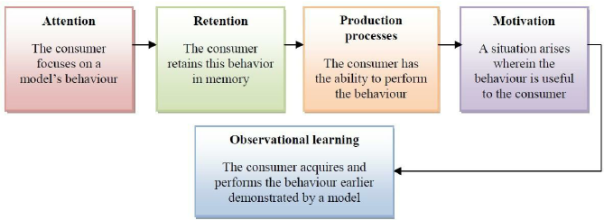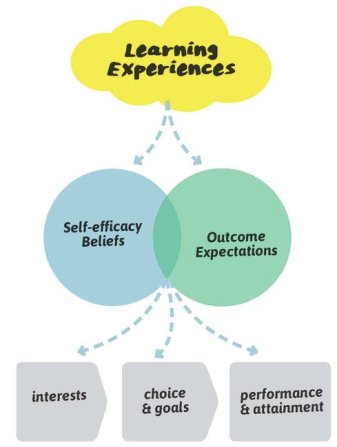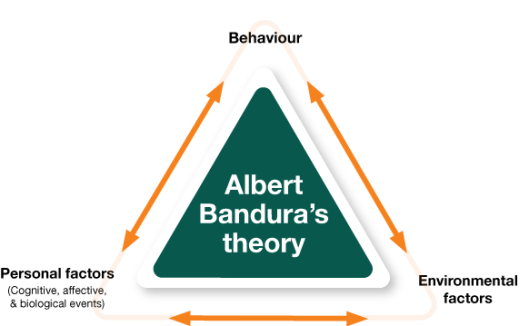Albert Bandura’s
Social Cognitive Theory
Hey, hey, hey! Welcome back! Today you’ll learn all about the Social Cognitive Theory, should be fun.
The Social Cognitive Theory is a communication theory about learning that was developed by Albert Bandura in the 1960s. This type of learning takes place through observation. The theory suggests that people learn behaviours by watching others and imitating them. They tend to watch those who are in authority over them or who they like – for example, parents or celebrities. People learn from models through facilitation, inhibition and disinhibition. He believes that all behavioural, cognitive and emotional learning of direct experiences, can be accomplished vicariously by observing people’s actions and consequences for them. Depending on whether people are rewarded or punished for their behaviour, that behaviour is modelled. The media provides numerous models for just about everyone to choose from.
There are four processes included in observational learning: Attention, retention, production process and motivation.

I’ll show you a short clip before we go any further. The clip below is a movie called Big Daddy. In the video you’ll see how Julian (the little boy) learns so much from Sonny by just observing him.

I’ll mainly be making reference about children because “their minds are like sponges, soaking up every verbal and non-verbal interaction.” ~ Asa Don Brown. They model behaviour based on interacting with their families.. I remember a time back when I was babysitting. The baby’s dad smokes so when the baby came over, he was doing the smoking action. You should be cautious about what you do around children because toddlers absorb everything. Self-efficacy is a key element in this theory. It has to do with observers ability to perform a particular behaviour and also, the confidence that individual has to perform the behaviour. Have you ever watched Scandal? Let’s say that you admire Olivia Pope and you believe you can pull off everything she does then having the confidence to achieve this is key. On the other hand, Outcome expectations is the value attached to these expectations.

Environment includes social and physical environment. Personal factors includes mental cognition and behavior is affected by the situation.
Social Cognitive Theory of Mass Communication
The Social Cognitive Theory within the media is basically behaviours that we learn via the media. The role mass media plays within our daily lives is extremely influential, whether we realize it or not. Violence on television is one example of how media can influence our behaviour. It is proven that constant consumption of violent TV shows and movies impact the viewers so much, causing them to mimic these behaviours. Rude and aggressive behaviour is also picked up through the media. Some children may watch their favourite shows and see the kids on screen being rude or aggressive to everyone around them, and in turn the children model that behaviour in the real world, thinking that it is “cool”. Children accept all kinds of behaviours they observe, so it is absolutely important to be aware of what they are exposed to. However, this theory can teach good modeling behaviour, as seen in the video above. It’s amazing that as people we all live in the same world, yet we are all completely different individuals. No one is the same, so a specific model on media may attract me but not you. Say for instance you have a specific career goal in mind and you watch a show and the people on the show embodies everything you want to be and more – Young, of colour and successful. You will be motivated to go out and achieve this goal as well because the outcome is interpreted as successful and your self efficacy is raised. Even for little children having their own little goals in mind, thinking they can be superman by just putting on the suit, haha… cute. Whatever floats your boat right?
Concluding, this theory applies to people of all ages. The essence of this theory is within the scientific realm under the socio-psychological tradition. This is a good scientific theory because it explains the past and present but also predicts future events of what will happen when people model behaviours seen on screen or off screen. I feel like humanism can play into this theory as well because humanistic psychologist examine behavior through the eyes of the observer and also, through the eyes of the person doing the behaving.
That’s all for now guys, but stay tuned for my post on Agenda Setting!

The examples used were very helpful in showing the theory’s application. Showing the connection between the original theory and how it is applied in the field of communication helps to show that communication goes far beyond speaking and listening.
LikeLike
I’m glad you understood and enjoyed it.
LikeLike